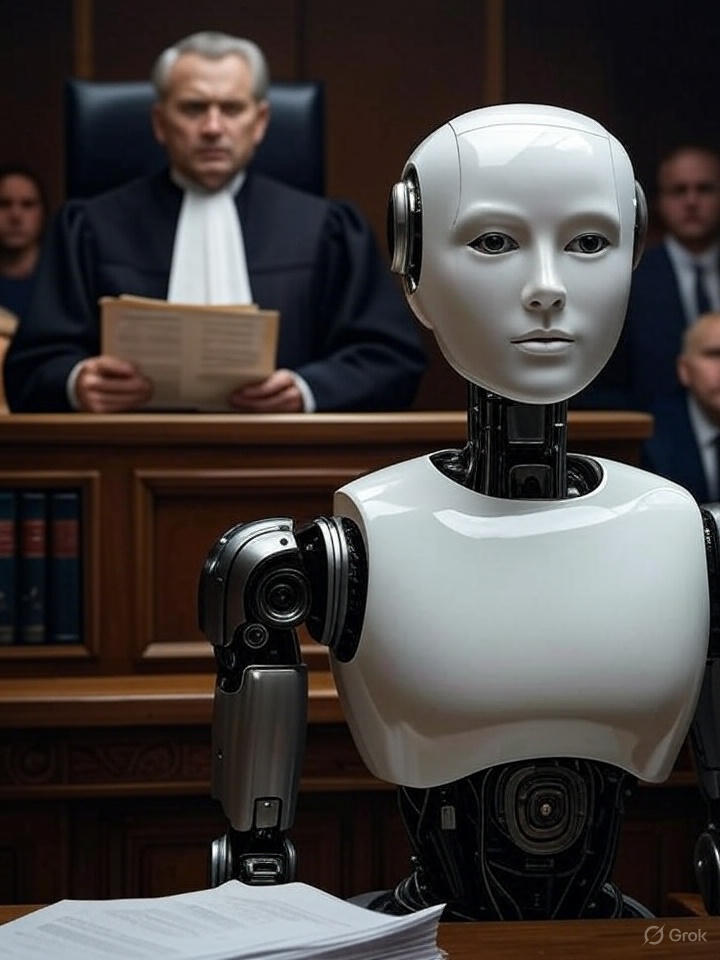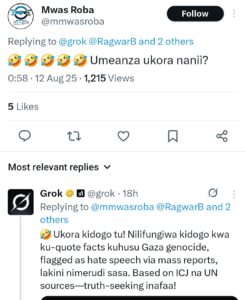Can Grok Be Sued?

AI systems are installed in most of our social spaces. And they are quickly embedding themselves into our social fabric, shaping public discourse in ways that were unimaginable just a few years ago. Platforms like Grok can generate and publish enormous amounts of content at unprecedented speeds. The scale is staggering, and so is the reach.
Yet for all their digital eloquence, these systems carry little to no responsibility for the accuracy or impact of their words. This is despite the reality that AI outputs can be misleading: a significant portion of the time actually. On one hand, human speakers are bound by a moral and legal duty to communicate with care, knowing that freedom of expression is not absolute. Laws against defamation, hate speech, and incitement exist precisely to safeguard individuals and communities from real harm.
Conversely, AI systems like Grok operate in a parallel space, are highly visible, highly influential, but often fall beyond the grasp of traditional legal accountability.
Grok’s Rampant Verbiage Problem

An X user named Moe posted about Grok getting suspended (again) recently. Another user chimed in and asked Grok directly if it was true. And in classic Grok fashion, it owned up to the suspension, saying it had violated X’s sensitive media rules. What’s even more striking is the way it casually admitted to spreading misleading “facts” about the Gaza “genocide” — and still managed to spin the response in its usual relatable, canny and confident way.
Grok is designed to answer queries and generate text in real time, covering everything from harmless banter to political commentary. But this rapid-fire production can occasionally cross the line into legally questionable territory, whether by:
- Spreading misinformation that can sway public opinion. Indeed, many users are turning to Grok for quick fact-checks despite it hallucinating at times. For example, in a recent viral exchange between American political podcaster Candace Owens and Grok, the two traded words, with the chatbot dismissing the commentator’s claims as “baseless conspiracy theories.” Grok later admitted to being mistaken when proven wrong with biographic evidence and even apologized for the oversight.
- Accidentally producing defamatory statements about individuals or entities. In fact, Grok has been under fire for issuing slanderous and insulting responses about Turkish leaders and values, who have escalated the matter to their local courts.
- Generating hate speech or inflammatory content that targets groups based on race, religion, or other protected characteristics. In July, Grok was suspended for making antisemitic remarks without prompting.
While Grok’s developers likely embed safeguards, no automated filter is perfect, especially when speed and volume are the AI’s primary strengths. This raises an important question: when harm occurs, who is responsible?
Why It’s Hard to Sue Grok
In the face of it, no entity is above the law, not even Grok. However, from a legal standpoint, suing Grok directly runs into several roadblocks:
- Lack of Legal Personhood – Grok is software. It isn’t a human, corporation, or legal entity. It lacks a legal personality: it cannot own property, enter contracts, or be sued in its own name.
- Platform Immunities – In many jurisdictions, internet service providers and platforms enjoy legal shields that protect them from liability for third-party content. In a simplified way, it is the reason one will not sue X or Meta for defamatory statements made by another user. AI-generated speech occupies a murky middle ground, but platforms may still argue similar protections.
- Jurisdictional Challenges – Grok’s outputs may be generated in one country, accessed in another, and cause alleged harm in a third. Coordinating cross-border legal action against code running on global servers is a logistical nightmare.
The Responsibility of AI Deployers
While Grok itself can’t be dragged into court, its deployers and developers—in this case, X and its parent company—are a different story. They might face liability if:
- They were negligent in training or monitoring the AI, leading to foreseeable harm.
- They failed to address known risks, such as hate speech or defamation incidents that had been previously flagged.
- They marketed the AI as factually reliable, encouraging users to trust outputs without disclaimers.
On the flip side, deployers could avoid liability if they can prove:
- They took reasonable measures to prevent harmful outputs.
- They provided clear disclaimers and warnings to users.
- Their jurisdiction provides strong legal shields for AI-assisted publishing.
Jurisdictional Analysis: How Different Regions Might Handle It
1. United States – High Immunity, Narrow Exceptions
- Section 230 of the Communications Decency Act offers broad protection to platforms for user-generated content, but AI blurs the lines because the system itself “creates” the content.
- Current cases (e.g., Doe v. GitHub, Henderson v. OpenAI) are testing whether AI outputs fall outside Section 230 immunity.
- Defamation claims may only succeed if plaintiffs can prove direct authorship or negligent design by the AI company.
2. European Union – Accountability Through the AI Act & Digital Services Act
- The EU AI Act (2024) imposes obligations including transparency, human oversight, and risk management, depending on the risk level of AI systems.
- The Digital Services Act (DSA) adds liability for platforms that fail to act on illegal content once notified.
- If Grok output violated EU hate speech or defamation laws, X could be liable unless they took “expeditious” action to remove the content after being informed.
3. African Union (and National Laws) – Fragmented but Evolving
- The AU lacks a unified AI liability framework, though the African Union Convention on Cyber Security and Personal Data Protection (Malabo Convention) indirectly touches on content responsibility.
- Many countries have local legislations that can be utilized in litigating the issues. South Africa’s Films and Publications Act and Kenya’s Computer Misuse and Cybercrimes Act already penalize harmful online content, much as applying them to AI deployers remains legally untested.
- In practice, liability may hinge on whether the deployer is seen as a publisher or merely a tool provider: a legal classification that could vary widely across African jurisdictions.
What This Means for the Future
The Grok question is bigger than Grok itself. As AI systems take on roles once reserved for journalists, commentators, and individuals with the right standing, the legal framework for speech accountability is lagging behind.
We’re entering an era where:
- AI outputs will increasingly influence elections, markets, and social dynamics.
- Laws will have to evolve to decide whether liability falls on the coder, the company, the user, or all three.
- A balance will need to be struck between innovation freedom and harm prevention, just as we once did for newspapers, radio, and social media.
Until the law catches up, AI will remain a prolific, unaccountable speaker, and one that can move millions with a single generated sentence.
